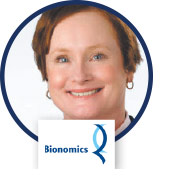Life Science: Inside four Australian and New Zealand companies that are changing the biotech landscape

The success of life science companies CSL, Resmed and Cochlear are well known and they are now worth over $130 billion in total, but they were once small companies.
PPM’s Core Investment Strategy focusses on well established companies with strong financial positions with attractive return characteristics. In addition to our Core Investment Strategy we do invest in earlier stage companies, while these don’t have the level of predictability of the Core Strategy, and they are not for every client, we feel it is important to support these companies as from their midst will emerge future leaders.
A discussion by Hugh MacNally, Chairman and Founder of Private Portfolio Managers
The CEOs of four life science stocks talk about what their companies are trying to achieve and the problems they face.
 Leslie Chong,
Leslie Chong,
Managing Director and CEO Imugene
Imugene is a clinical stage immuno-oncology company developing a range of new and novel immunotherapies that seek to activate the immune system of cancer patients to treat and eradicate tumors. The product pipeline includes multiple immunotherapy B-cell vaccine candidates aimed at treating a variety of cancers in combination with standard of care drugs and emerging immunotherapies.
 Deborah Rathjen BSc (Hons), PhD, MAICD, FTSE.
Deborah Rathjen BSc (Hons), PhD, MAICD, FTSE.
CEO and Managing Director Bionomics
Bionomics is a biopharmaceutical company dedicated to making better treatments for cancer, central nervous system disorders such as anxiety, depression and Alzheimer’s disease.
 Sam Cobb,
Sam Cobb,
Founding CEO AdAlta
AdAlta Limited is a highly innovative drug discovery and development company using its powerful technology platform to generate a promising new class of protein therapeutics, known as i-bodies, that have the potential to treat some of today’s most challenging medical conditions.
 Ralph Highnam, PhD
Ralph Highnam, PhD
CEO Volpara Solutions
Volpara Health Technologies Limited is a development and manufacturing company that develops digital health solutions to enable personalized, high-quality breast cancer screening based on objective measurements of breast density, compression and radiation dose.
1. What is the unmet medical need you are addressing?
LC: In 2012, 14.1 million new cases of cancer were reported worldwide. Australia alone is projected to have 138,321 new cases of cancer diagnosed in 2018. Specifically, we are looking at technologies to combat and treat breast cancer.
DR: Bionomics is a neuroscience company and our mission is to find innovative, more effective and safer treatments for conditions such as such as anxiety, depression, Alzheimer’s disease and post-traumatic stress disorder (PTSD).
Our lead drug BNC210 is in phase 2 clinical trial, and is focussed on the treatment of PTSD, agitation and behavioural disturbances in dementia, chronic anxiety and panic attacks. We also have a drug under development by our partner Merck & Co. (known as Merck Sharp and Dohme or MSD in Australia) for the treatment of memory loss in Alzheimer’s disease and other conditions.
Many current treatments for these conditions were approved several decades ago and have serious side-effects associated with their use including addiction, potential for causing strokes in older people and increasing suicidal thoughts in younger people. There are no approved treatments for agitation and behavioural disturbances in elderly people suffering from dementia.
SC: AdAlta is pioneering a next generation antibody technology called an ‘i-body’, with our lead therapeutic AD-214 being developed for the treatment of fibrosis. Fibrotic diseases are characterised by inflammation and collagen build-up, causing scarring of vital organs, irreparable damage and eventually organ failure.
RH: Breast cancer screening saves lives but can be optimized further. One way for it to be optimized is to personalize it based on the woman’s breast density, the percentage of the breast which is fibrous or glandular tissue as opposed to fat. The higher the breast density, the higher the risk of developing cancer, but also the higher the risk that a cancer will be missed by screening. The unmet medical need is for an accurate and reproducible measure of breast density – that’s what our foundation software product, VolparaDensity, resolves by applying AI algorithms to breast x-rays.
We’ve now advanced beyond that first product to address the unmet medical need for the highest quality breast images done at the lowest radiation dose possible and with the most comfort. VolparaEnterprise provides automated measures for dose, compression, quality and productivity to allow the breast imaging managers to truly offer the best care to her patients in the most effective manner.
2. What is extent of the problem?
LC: Current cancer therapies, depending on the type of cancer, age, state of health and other prognosis’s of the patient, typically extend survival by only weeks or months. In recent years, immuno-oncology has shown more promising results. Unique immuno-oncology therapies for certain patients are extending lives by years and possibly even leading to a “cure”.
DR: The illnesses being tackled by Bionomics’ technology and drug candidates are on the rise worldwide, in part because of the aging population and improved diagnosis. Here are some statistics for Australia that describe the magnitude of the problem in mental health and neurodegenerative conditions, including Alzheimer’s disease.
It is estimated that 413,106 Australians are living with dementia and 291,163 people are providing care. These figures are projected to increase dramatically. In addition to memory loss, there are also other issues related to anxiety, agitation and aggression that patients and carers face. 1 in 5 Australians experience a mental health condition in a given year and almost one in 2 will experience a mental health condition at some point in their lifetime. Every year, around 14% of all adult Australians are affected by an anxiety disorder, nearly 6 per cent of the population will experience generalised anxiety disorder in their lifetime.
Around 12% of Australians will experience PTSD in their lifetime. The world health organisation has reported that depression is the leading cause of illness and disability in the world with more than 300 million people suffering from its effects with estimates that every 40 seconds someone in the world commits suicide.
SC: It has been estimated that fibrosis can be attributed to 45% of all deaths in the developed world. Idiopathic Pulmonary Fibrosis (IPF) is a condition of the lungs, affecting approximately 300,000 people in USA and Europe. With just two IPF drugs on the market, and a poor median survival of only 3-5 years, this is clearly an area of high unmet clinical need.
RH: Our market is global, some 500,000 women die each year from breast cancer, and deaths are sadly increasingly rapidly across Asia. Breast cancer screening is conducted on some 40 million women a year in the US, and about the same outside the US, mostly in population wide screening programs. VolparaDensity has been used in some 36 countries around the world and appeared in over 270 publications. In financial terms, we believe that ultimately, we can get towards US$10 per woman per year for a complete and expanded range of screening services, making the total available market in the one-billion-dollar range.
3. In what way is your approach novel?
LC: Unlike traditional cancer therapies like chemotherapy, radiation or targeted therapies, immuno-oncology therapies work by invoking your own immunity against the cancer. Imugene is developing cancer vaccines that work to elicit an antibody response via your bodies B-cells. In other words, it activates your immunity towards a specific cancer target. Our approach may lead to less toxic therapies, and a better long-term safety profile than existing treatments.
DR: BNC210 is “first in class” which means that it is modulating brain systems in a way that hasn’t been done before to reduce the symptoms of anxiety, depression, stress and trauma. It was discovered by Bionomics using our proprietary technologies meaning that the patent position on bnc210 is very strong with granted patents around the world pointing to its novelty. Unlike current medications bnc210 is non-sedating, doesn’t impair memory or movement and it works rapidly, with clinical data supporting its effectiveness as an anti-anxiety treatment.
SC: Both our i-body platform and lead candidate, AD-214, are novel in a number of ways, offering a new and more effective approach to treat a range of human diseases. Our i-body is a world-first in next generation antibodies; it is the only single domain human protein with a very long loop (modeled on the shape of a shark single domain antibody). The i-body can go places other therapies can’t, in a very targeted way.
Our i-body therapy AD-214, has anti-inflammatory and anti-fibrotic effects, which it achieves by binding to a target called CXCR4, a novel pathway not currently addressed by approved IPF drugs or candidates in the clinic.
4. What part of journey from laboratory to the marketing of a new product does your company do and how would the rest of the journey be traversed?
LC: Imugene is currently in the clinic with our technology. We are gathering patients’ data from our study to attract a bigger pharmaceutical or biotech company to either collaborate or to license our treatments.
DR: Bionomics is focussed on discovery through to phase 2 clinical trial with the help of partners such as MSD to take our therapies to market.
SC: AdAlta is a drug discovery and development company with a library of over 20 billion different i-bodies that have the ability to drug diseases considered “undruggable”. Our i-body platform offers a more effective and powerful approach to the treatment of a wide range of human diseases. We are focused on partnering our i-body platform with big pharma, while retaining the ability to resource and focus on our own in-house discovery and development activities.
RH: Our AI algorithms are being applied with the benefit of hundreds of years of experience in breast imaging, that’s allowed us to generate algorithms which work on images from all x-ray manufacturers equipment which is and will remain a key differentiator for us.
5. What is the current stage of development of your lead candidate and where to next?
LC: Imugene is currently in the clinic with our HER-2 receptor targeting therapy called HER-Vaxx. HER-Vaxx is in a Phase 1b/2 clinical trial in newly diagnosed gastric (stomach) cancer. We are anticipating extending this to a randomized phase 2 study that will provide us with a solid proof-of-concept.
We also have a PD-1 peptide cancer vaccine. We are currently putting together an Investigational New Drug (IND) package that will include pre-clinical and toxicology studies (i.e. tests to show safety) to be submitted to the U.S. FDA so that we may conduct a clinical trial in cancer patients.
DR: BNC210 is in phase 2 clinical trials with results from a trial conducted in patients with PTSD due in September 2018. Results from a second phase 2 clinical trial in hospitalised elderly patients with agitation are anticipated prior to the end of March 2019.
BNC210 has previously demonstrated efficacy in suppressing panic attacks and in treating people with generalised anxiety disorder, a common, chronic form of anxiety. With many potential applications for BNC210, Bionomics will seek to partner BNC210 with a company that can broaden its development, for example in depression. Together with the applications that Bionomics has taken into clinical trials, the intention is to take the drug to market, in return for upfront and milestone payments plus a royalty on product sales. Bionomics would like to remain involved in the future development of BNC210 however we anticipate that our partner would fund its ongoing development and ultimate marketing.
SC: We are completing manufacturing and preparing AD-214 for our final safety study before taking AD-214 into human trials in the first half of 2020. Our strategy is to develop AD-214 and other i-body candidates to a major inflection point then partner with a biotech or pharmaceutical company to bring it to market.
6. The complexity of the US health system has often been a stumbling block for foreign medical technology, what problems has Volpara faced?
RH: The US is where the early adopters of breast imaging exist, and we devised our product from the start for the US market. In the US, you need to show that you improve patient care but that you also offer an excellent return on investment story for your customer. We realized from the start that getting new reimbursement codes through would be too difficult so that we had to focus products onto areas where we could demonstrate reduced costs for a site, and increased revenues. Over the last 6 months, we’ve generated many case studies now showing how we are achieving that at sites across the US, and they are now being used by our direct US sales force to generate new sales.
7. How far have sales for Volpara advanced in the last 12 months?
RH: We started FY2018 year covering 0.7% of US women, and we ended with 3.2%, with a corresponding jump in annual recurring revenue from just over NZ$1 million to NZ$3.6 million, and quarter one of FY2019 has started strongly. We are first moves in breast imaging analytics with Volpara Enterprise and the recent capital raise has given us the fire power to push ahead aggressively.
PRINT THIS ARTICLE
